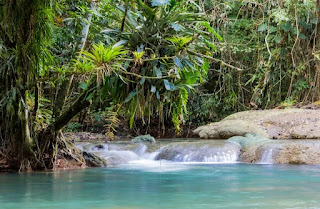The Importance of Rivers To Biodiversity
“Rivers are the arteries of our planet; they are lifelines in the truest sense.”- Mark Angelo.
National Geographic defines a river as a ribbon-like body of water that flows downhill from the force of gravity. A river can be wide and deep, or shallow enough for a person to wade across. A flowing body of water that is smaller than a river is called a stream, creek, or brook. Some rivers flow year-round, while others flow only during certain seasons or when there has been a lot of rain. The largest rivers can be thousands of miles long. All rivers have a starting point where water begins its flow. This source is called a headwater. The other end of a river is called its mouth, where water empties into a larger body of water, such as a lake or ocean. Rivers can also form what is called an estuary, where salty seawater mixes with fresh water near the river mouth to form “brackish water.” Nothing is more soothing than having a river dip on a hot summer’s day or rafting on the Rio Grande. Did you know that Jamaica, a small island in the Caribbean, has more than 100 rivers? Of the 120 rivers in Jamaica, the three largest and most popular are the Rio Grande located in the parish of Portland, the Yallahs River found in the parish in St. Thomas and the Black River in St. Elizabeth. The Black River is the widest river on the island, while the longest river is the Rio Minho. Some rivers on the island are also underground rivers which flow through limestone caves. The United Nations World Rivers Day is celebrated annually to raise and spread awareness about the role and importance of rivers and other waterways, and the threats that could potentially endanger the waterways around the world, as well as to promote the improved stewardship of all waterways for sustainable development. Sustainable Development Commission states sustainable development is development that meets the needs of the present, without compromising the ability of future generations to meet their own needs. The concept of sustainable development can be interpreted in many different ways, but at its core is an approach to development that looks to balance different, and often competing, needs against an awareness of the environmental, social and economic limitations we face as a society. The day is observed on the fourth Sunday of September and falls this year on September 25. The theme for this year’s World Rivers Day is ‘The importance of Rivers to Biodiversity’. Biodiversity refers to the variety of living species on Earth, including plants, animals, bacteria, and fungi. While Earth’s biodiversity is so rich that many species have yet to be discovered, many species are being threatened with extinction due to human activities, putting the Earth’s magnificent biodiversity at risk. Regrettably, many of us dump garbage and refuse in our rivers. Our rivers are highly polluted and remain unhealthy for life. Yet, we consume the fish and other forms of food from our rivers not realizing or perhaps we do not care. The absolute need for rivers to keep any civilization going is the focus of this year’s theme. Not only humans, but rivers keep a wide range of animals and plants as living breathing parts of our ecosystem.
Background
Rivers play an important role in ecosystem and are extremely helpful to human life. They are one of the biggest sources of freshwater. Rivers not only provide us with fresh drinking water, but also provide water for domestic needs (e.g., food, energy, recreation, hygiene) and agricultural purposes (e.g, irrigation). They also provide a pathway to enable people and goods to move or transport from place to place. In recent decades, human activities driven by industrialization, urbanization and population growth have caused pollution and damage to numerous waterways around the world, particularly in the areas where people regularly use the rivers as a source of water and transport. Virtually, rivers in every country face an array of threats and thus need to be sustainably managed. Much of the Earth’s biodiversity, however, is in jeopardy due to human consumption and other activities that disturb and even destroy ecosystems. We all have a role to play in protecting our rivers. It is by safeguarding our rivers that we are protecting not only our source of food but also the ecosystem at large. There is an urgent need to strengthen our environmental watchdog groups. The National Environment and Planning Agency (NEPA) the government's agency with the mandate for environmental protection, natural resource management, land use and spatial planning in Jamaica needs more teeth. These organizations must be better resourced in terms of human and financial resources. Our educational institutions must be brought into the conversation and more environmental clubs in our schools is one practical way that the next generation can become involved in learning about the importance of rivers to biodiversity. We must redouble our efforts in urging stakeholders both at the national and community level to pay more attention to our rivers. Our rivers sustain life so why not give of your time and give a river a voice! We all need to get involved in the supervision and protecting of our rivers.
In the words of Mark Twain, the river has great wisdom and whispers its secrets to the hearts of men.
Wayne Campbell is an educator and social commentator with an interest in development policies as they affect culture and or gender issues.
waykam@yahoo.com
@WayneCamo
©
#WorldRiversDay




Comments
Post a Comment